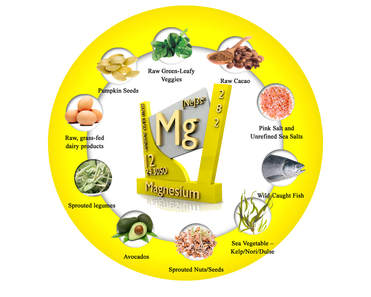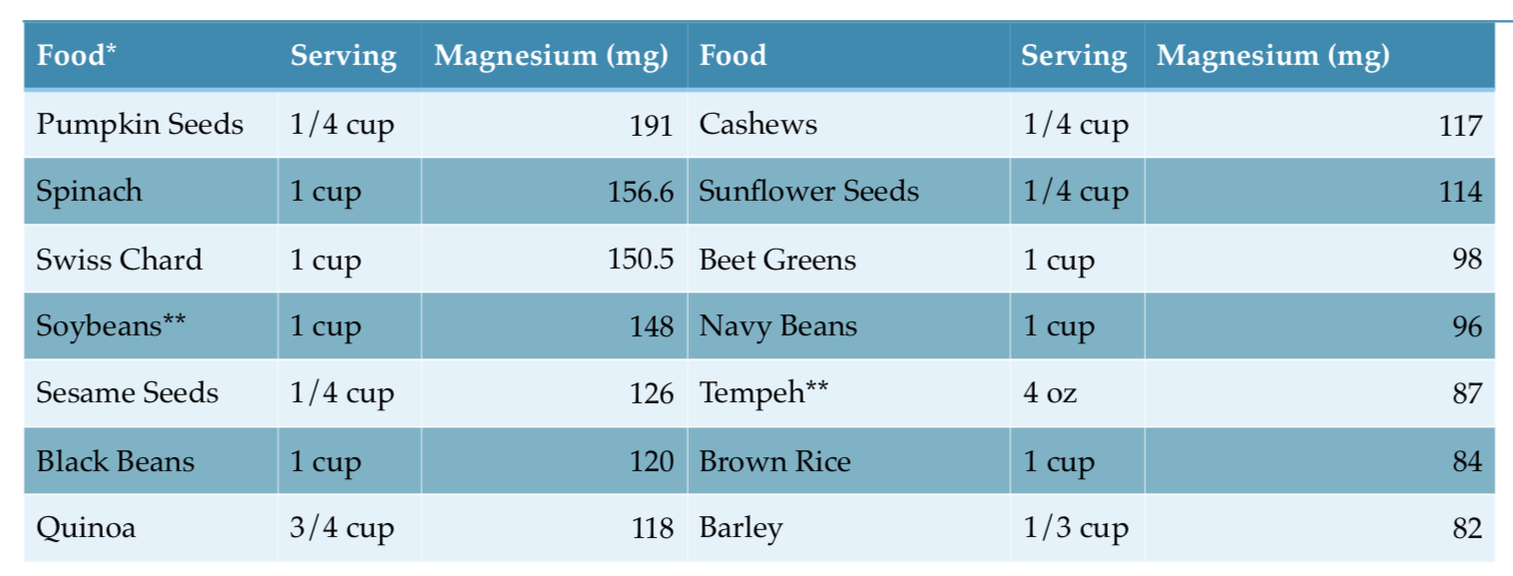|
By Louanne Saraga Walters, MS HNFM
Magnesium. Mg. The 12th element on the periodic table. When I first begin talking with people about magnesium, I generally get confused looks and knitted eye-brows. Why would anyone want to take a supplement containing a substance used as a metal?!
What Does It Do?
As a quick answer, magnesium is arguably one of the most important minerals for our health, as evidenced by the hundreds of now discovered functions it handles (and perhaps hundreds more we simply don’t know about yet). Take a look at this list of duties!
And these are only a few of the functions we know about now! Magnesium deficiency, meaning the levels of magnesium needed for all of these body functions is simply not enough, can produce serious conditions and lead to disease. Insufficient magnesium can lead to high blood pressure, heart disease, Type 2 Diabetes, stroke, migraine headaches, Alzheimers and more. How Much Do We Need? The current Recommended Daily Allowance (RDA), the suggested amount for the average healthy individual to consume, is 310-420 milligrams per day. But the average actually consumed is far less, with estimates of greater than 60% of adults in the U.S. underconsuming the RDA. Why? Because depending upon your cultural diet (American, European, Mediterranean, etc), you may not be exposed to enough magnesium containing whole foods. What Foods Contain Magnesium? Magnesium is abundant in green leafy vegetables, beans, seeds and some grains. TI compiled this table by pulling foods from an evidenced-based website called World’s Healthiest Foods, which lists the nutrient content of hundreds of foods.
Take a look at these magnesium-rich foods and take a moment to think of how often you might eat from this food group. Once per day? Once per week? Once per month? Even if the answer is once per day, you could be short-changing your body’s magnesium needs!
How Do I Find Out My Magnesium Status? Because magnesium is stored in bone (49.5%), tissues and organs (49.5%), and blood (1%), a blood test barely touches the surface of a person’s magnesium status, and unless there is a suspected severe deficiency, blood tests are not used. Urinary magnesium levels via a loading test is considered the most accurate and require a dose of magnesium given before the test starts, with urine samples taken for 24 hours to measure output. However, this test is avoided in patient’s with kidney issues. Further, an individual's ability to absorb magnesium can be affected by a number of things including genes, medications, toxins and even other nutrients. So as vital a role as magnesium plays in our bodies, it's also important to have a good gauge of our total daily average magnesium intake. Using a Diet Record Analysis (DRA) to Discover Magnesium Intake One good way to estimate your daily average intake of magnesium is a Diet Record Analysis (DRA). This 3 or 4 day analysis requires a detailed tracking of everything you eat and drink, listed by ounce, gram, milligram and teaspoon or tablespoon. Brand names are important. Listing everything is vital to gain a comprehensive and complete look at your nutritional intake in that time frame. This information is then entered into a software program which asks further questions about age, gender and lifestyle, and a complete listing of nutritional sufficiencies and deficiencies is then produced. (If you do not have a clinic or nutritionist in your area, order your Wellness APEX™ DRA at the introductory rate through August 31, 2018.) NOTE: It’s advisable to let any nutritionist or healthcare practitioner also know what medications you may be on, as certain medications may also hinder your body’s ability to absorb magnesium (as well as other nutrients). How Does Magnesium Help Conditions and Diseases? The research is extensive, but a few tried methods show great success when magnesium is supplemented appropriately with whole foods first (if possible) and recommended/tested supplements:
How Much Should I Take? Adding magnesium rich whole foods to your diet is the primary goal. As a Nutritionist Educator, I recommend aiming to eat the RDA of any nutrient in whole foods first. For magnesium, that means building a diet of magnesium rich foods to aim for 310 - 420 mg per day. We do also know that that’s not always possible, or certain medications or even other nutrients may deplete our body’s ability to absorb all the magnesium in the foods we eat. So if you’re going to add a magnesium supplement, aim for one that offers 200 mg per capsule or tablet, and seek your doctor’s advice to whether you need to double that amount. Step one is to be aware of what you’re eating. Are you getting enough magnesium in your average daily consumption? Have you requested a Diet Record Analysis to double check your estimations? For a nutrient as important as magnesium, set the second guessing aside. After all, there’s a reason magnesium is the ninth most abundant element in the Universe!
0 Comments
Leave a Reply. |
AuthorLiving my WellnessME.Life is our quarterly newsletter, compiled of separate blog posts created by Louanne and Sharon Saraga Walters and contributed by esteemed healthcare practitioners, colleagues and friends with a holistic (interrelated, synergistic, systemic) view of wellness. Archives
January 2019
Categories
All
|




 RSS Feed
RSS Feed